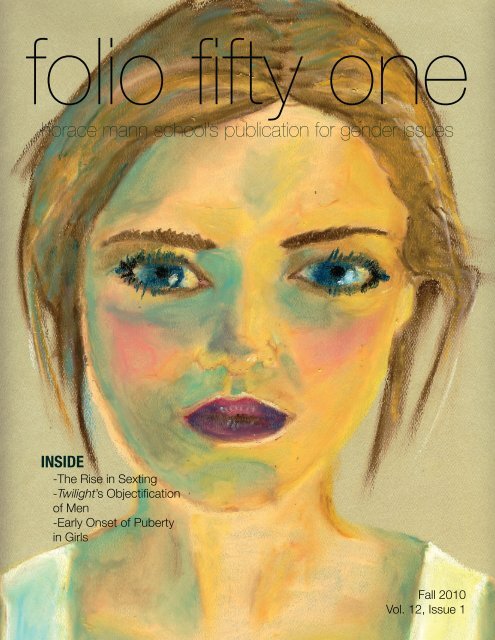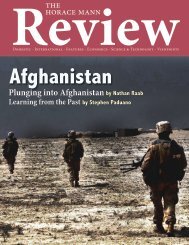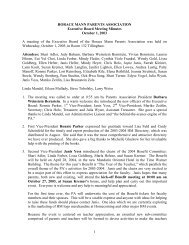horace mann school's publication for gender issues
horace mann school's publication for gender issues
horace mann school's publication for gender issues
Create successful ePaper yourself
Turn your PDF publications into a flip-book with our unique Google optimized e-Paper software.
folio fifty one<br />
<strong>horace</strong> <strong>mann</strong> school’s <strong>publication</strong> <strong>for</strong> <strong>gender</strong> <strong>issues</strong><br />
INSIDE<br />
-The Rise in Sexting<br />
-Twilight’s Objectification<br />
of Men<br />
-Early Onset of Puberty<br />
in Girls<br />
Fall 2010<br />
Vol. 12, Issue 1
folio 51<br />
volume 12, issue 1<br />
Editors-in-Chief<br />
Sinclaire Marber<br />
Victoria Marlin<br />
Sarah Swong<br />
Editor Emeritus<br />
Maia Salholz-Hillel<br />
Managing Editor<br />
Jessica Chi<br />
Layout Editor<br />
Alex Ma<br />
Associate Layout Editor: Halle Liebman<br />
Section Editors<br />
Maya Chung<br />
Jasmine Mariano<br />
Zoe Rubin<br />
Rebecca Segall<br />
Olivia Spector<br />
Art Editors<br />
Alice Taranto & Jenny Lim<br />
Associate Art Editor: Alex Brachfeld<br />
Copy Editor<br />
Pamela Mishkin<br />
front & back cover by alice taranto<br />
Letter from the Editors<br />
Folio 51 is a <strong>gender</strong> <strong>issues</strong> <strong>publication</strong> that strives to in<strong>for</strong>m the Horace Mann community about men’s and women’s <strong>issues</strong> and to<br />
provide writers and artists with a com<strong>for</strong>table <strong>for</strong>um to discuss opinions on international, domestic, art, health, sports, and school news.<br />
In your hands is Volume XII’s first issue. From Billie Kanfer’s report on the phenomenon of sexting to Vivianna Lin’s investigation on<br />
the debate surrounding masculinity in China’s boys, This <strong>issues</strong> addresses “High School,” or adolescent, <strong>gender</strong> <strong>issues</strong> to illuminate and<br />
elaborate on <strong>gender</strong> <strong>issues</strong> that affect the student body and people our age most directly. The magazine has also allowed vocal members<br />
of the community to share their thoughts on <strong>gender</strong> <strong>issues</strong> in opinion pieces, such as Dr. Casdin’s reflections on his experience at an<br />
all boys school. As we approach the end of our time at Horace Mann, this issue is particularly meaningful to us and we hope you enjoy<br />
it as much as we’ve enjoyed working on it. We would like to thank our writers and artists <strong>for</strong> their thought-provoking work and Ms.<br />
Woods and Ms. McFeely <strong>for</strong> their support.<br />
Sarah Swong, Sinclaire Marber, and Vicky Marlin<br />
Class of 2011
table of contents<br />
table ofcontents<br />
<strong>horace</strong> <strong>mann</strong><br />
For Boys 4<br />
Defining Success: A Difference Between Male and Female Adolescents 6<br />
The Stigma About Male Per<strong>for</strong>mers 6<br />
Poll: Leadership, Expectation, and Gender at HM 7<br />
domestic<br />
The Social Phenomenon of Sexting 8<br />
Strangulation 9<br />
Trans<strong>gender</strong> Adolescents Face Discrimination, Violence 10<br />
international<br />
Saving the Boys 12<br />
Yemeni Child Marriages 13<br />
health<br />
Precocious Puberty 14<br />
The Importance of a Father-Son Relationship 15<br />
COMPUGIRLS: A Click in the Right Direction 15<br />
arts<br />
Sexism in Twilight 16<br />
“Growing” by Larry Rivers: Art or Child Pornography 16<br />
Interview with Wendy Cromwell 17<br />
sports<br />
Uni<strong>for</strong>m Inequity: The Dangers of Female Sports Attire 18<br />
Equitable Athletics: Gender Identity in Track 19
Opinions <strong>horace</strong> <strong>mann</strong><br />
<strong>horace</strong> <strong>mann</strong><br />
For Boysby<br />
Adam Casdin<br />
I attended an all boys school from first grade to twelfth. Every<br />
morning we entered through red doors into our <strong>for</strong>mal education<br />
with the school’s name arched above us as we went in, and, nestled<br />
underneath it, the declaration “<strong>for</strong> Boys.” Was that really what our<br />
school was <strong>for</strong> We were boys, yes, later young men, ragamuffins<br />
mostly, ties and jackets notwithstanding, with the occasional<br />
gentleman thrown in. Sweet ones and wayward ones, funny, sly and<br />
wild ones, a mix of treacherous and wise and curious boys. In other<br />
words, typical students. To us it was “all boys,” a term descriptive<br />
rather than proscriptive, with none of the unseen agency of “<strong>for</strong>.”<br />
In fact, the school never really seemed <strong>for</strong> us anyway.<br />
What or who was it <strong>for</strong> We’d have said, the amusement of our<br />
teachers, the edification of our parents, the sadism of certain<br />
upper classmen, the perpetuation of some ancient acculturation<br />
ritual supposedly dating back to the seventeenth century. We were<br />
well trained, of course. Very well trained. Yet much of what we<br />
valued at the time we picked up by the way, our inclinations at<br />
odds with the bare white walls of our classrooms and the chilly,<br />
<strong>for</strong>mal culture. Our rebellions, though, as we no doubt intuitively<br />
realized, were winked at, our tricks and treasons appreciated, even<br />
when punished. Marauding around the school, we felt ourselves<br />
participating in unspoken rites observed by our elders with a quiet<br />
pride. Self-definition, as our teachers no doubt knew, requires an<br />
authority to struggle against.<br />
Looking back, I’d say we had too many authorities, too much<br />
competition, too many struggles. Is that the nature of a boys’ school<br />
Not necessarily. Across town, another all boys school claims to<br />
raise up “scholars and gentleman.” At my school, they were training<br />
pirates. I mean that in the best sense—“privateers,” if you prefer,<br />
or, more euphemistically, “entrepreneurs.” Think Odysseus, not<br />
Black Beard. Piratical preppies—spirited, adventurous, sometimes<br />
heroic—we lived up to the word’s root in “trial, attempt, endeavor.”<br />
Intellectual courage was the school’s greatest gift to us, and we<br />
emerged game, trained to think our way through, or out of, any<br />
situation. Sometimes, that situation happened to be school itself.<br />
Years later, I heard a mocking anecdote about a professor I<br />
admired. Desperately shaking clenched his fists, he cried out to his<br />
students, “The Primal Horde is real!” His was emphatic support <strong>for</strong><br />
Freud’s idea that collectivism emerged out of a mythic rebellion,<br />
when sons banded together to destroy a repressive, dictatorial<br />
father. Sounds strange, but I knew exactly what he was talking<br />
about. My horde was real, and our struggle against the school’s<br />
strong, central authority helped us define our identities and our<br />
view of society, at least up to that point. That is as it should be.<br />
Students are meant to surpass the adults who guide them, to go on<br />
to become authorities <strong>for</strong> the next generation to struggle against.<br />
We won the fight, after a fashion, most of us anyway, not so<br />
much by defeating the father-figure as by outlasting him. That<br />
aspect of our education, if savage, was healthy. The energy of our<br />
horde, however, was not focused solely on a repressive system or<br />
leader. Unbridled competition trained us to be on the attack. We<br />
attacked everything: our work, opposing teams, Saturday nights,<br />
our teachers, and, sadly, each other. Rather than, in Freud’s vision,<br />
our collective outrage propelling us out of fearful servitude, we<br />
were enslaved to the battle itself. Instead of war buddies, we were<br />
adversaries. I say “we” but really speak, of course, about my own<br />
experience, though one echoed often enough by classmates over<br />
the years that I am willing to generalize.<br />
Casual cruelty, a certain off-hand viciousness was the norm.<br />
We were all implicated. A classmate of mine recently recalled our<br />
attending an assembly on Dr. Martin Luther King, Jr.’s “I Have<br />
a Dream” speech, introduced by a history teacher as, despite its<br />
“syntactical errors,” overall ‘a solid ef<strong>for</strong>t,’ or some similar quaint<br />
phrase. We were not stunned as we should have been. It was all part<br />
of the training. I know that children are cruel, that empathy comes<br />
later, perhaps only with a sense of our own mortality. If you had<br />
asked us then, we’d have said we meant no harm, that our slights<br />
and put-downs were playful jousting, not unlike cubs wrestling<br />
as preparation <strong>for</strong> the hunt. Serious play. Yet we were trained not<br />
only to win arguments, but to avoid losing. To lose was to open<br />
oneself up to ridicule and attack. Experts in finding and correcting<br />
weakness, in ourselves and in others, we also learned to mask it<br />
in ourselves and exploit it in others. We attacked instinctively,<br />
efficiently.<br />
4
<strong>horace</strong> <strong>mann</strong><br />
The story I would like to tell, finally, has to do with what became<br />
of me in this environment, a kid who never went through an antigirl<br />
phase, who was as happy playing with an Easy Bake Oven as<br />
with a GI Joe, who picked honeysuckles, loved frogs, and idolized<br />
the older boy who dressed in three-piece suits, wore a bowler,<br />
carried a cane and was called Radio T. Fybog. What changed all<br />
that It wasn’t the over-critical history teacher, or the irrational<br />
desk dumping, hang-you-by-your-ankles outbursts of the three<br />
hundred pound <strong>for</strong>mer karate champ English teacher, or the dread<br />
that the L----- brothers might catch you in the stairwell, or the wild<br />
eyed, white bearded, whiskey soaked History teacher who might<br />
go off at any minute like an exploding cigar. I wonder if women,<br />
in class and as teachers, would have humanized the place. I’m not<br />
sure. Mostly, I think, it was that our competitive energies were<br />
unchecked and ultimately misdirected, that it was an “all boys”<br />
school rather than one designed “<strong>for</strong> boys.”<br />
Whatever it was, I hit a low point in my eighth grade English<br />
class. I wish I could say that that recognition was brought on by<br />
something I read. My teacher did hand me a copy of The Catcher<br />
in the Rye with the words, “Adam, you are going to like this book,”<br />
but that only guaranteed I’d hate it. I out Holden’d Holden—he’s<br />
the phony, I thought. That year we had a particularly rowdy class,<br />
still only on its way to becoming truly vicious, and our teacher was<br />
new, idealistic, and a little shaky. A bad combination. I seemed<br />
not to have learned yet that the last person to disrupt class gets<br />
kicked out. Or else I enjoyed getting the boot. Whichever it was, I<br />
spent a fair amount of time in the hall, sitting on the floor outside<br />
the room as punishment. We made a sport of getting each other<br />
kicked out of class, and really I was happy sitting there lost in my<br />
own thoughts. My classmates, though, not content with my being<br />
tossed out, developed a game of pretending to see me peaking<br />
through the sliver of glass in the door, then making a big show<br />
of waving me away in warning until the teacher noticed them<br />
and came steaming out of the room, screaming down at me, arms<br />
flailing. Sitting there daydreaming, I looked so innocent I had to<br />
be guilty. Once, after getting particularly exercised, he slammed<br />
the door hard, shattering the glass. We thought, how do we top<br />
that The madder he got, the more inventive we became. It wasn’t<br />
just us. Another class hid in the closet, marching out singing the<br />
“Star Spangled Banner” after five minutes, walking by his desk and<br />
out the door as he sat there, head in hand. I developed a trick of<br />
raising my hand, answering a question, crawling under the desks<br />
to the other side of the room and raising my hand again. Simple<br />
but effective. My colleagues developed other pranks that I can no<br />
longer remember, all disruptive and disrespectful and all carried<br />
out without a second thought. One of the sloppy boys, shirt tails<br />
always untucked, snot everywhere, read a creative story about<br />
outer space warfare that went on the entire class and consisted<br />
mostly of stitched together curse words: “Holy shit, Captain, the<br />
goddamn f------- space cruiser is going to blow the crap out of<br />
our port engines, shit, fire on the mother, shit goddamn crap she’s<br />
coming at us…..” Our teacher was trying to be sensitive to his<br />
nascent literary talent. Actually, I don’t think that was a prank; he<br />
was always like that.<br />
As your experience may tell you, we were not inventing new<br />
classroom antics: we manufactured disagreements, argued petty<br />
points, concocted wild defenses of our essays to get the teacher<br />
to change our grades, and generally manipulated the class in any<br />
way we could. Through it all, our teacher tried hard to win us over<br />
in his sincere, sweet way, cajoling, bargaining, even appealing to<br />
our better selves. When he hung my “I hate my parents” poem<br />
in the main hall <strong>for</strong> the entire school to read, and ridicule <strong>for</strong><br />
years to come—the one I scribbled out last minute in class on the<br />
only subject close at hand—he was probably trying to reach out<br />
to me, sympathetically. Sadly, that was his undoing. Our grand<br />
finale came towards the end of the year, when a classmate had<br />
the idea to bring a tape recorder into the class. Our job was to<br />
rattle the teacher, disrupt him as much as we could without letting<br />
on that it was a game, while the spectacle was captured on tape.<br />
We succeeded beyond our expectations. As the class unraveled,<br />
the teacher pleaded, punished, tried playing along, lashed out,<br />
and finally broke down, sobbing quietly as he walked out of the<br />
room. We were stunned, and exultant. After a pause, we piled into<br />
the bathroom, pushing to get close enough to hear the tape, to<br />
review our triumph. We listened, snickering, gleeful, hearing him<br />
unravel again in the face of our repeated attacks, and then he was<br />
there, standing over us, as surprised to see us as we him. I will<br />
never <strong>for</strong>get the look he gave us that said, I knew you were rotten<br />
and vicious, but I did not know you were evil. All I remember is<br />
thinking, you’re right.<br />
alice taranto<br />
5
Opinions <strong>horace</strong> <strong>mann</strong><br />
Defining Success: A Difference Between<br />
Male and Female Adolescents BY ERICA CHIANG<br />
alice taranto<br />
What do you want to do when you grow up This is the age-old question that adults ask children. But what happens when you ask<br />
a young adult Do males and females view this question differently as they become adults Recently, when talking to a mixed-<strong>gender</strong><br />
group of teenagers, I noticed a trend in the answers. Females often gave personal answers, aspiring to make a difference to the world<br />
or their life like “helping third-world countries as an environmental engineer.” Whereas, the males answered the question in a more<br />
general way, responding in ways like “being successful” or “getting the big bucks.” Hearing these answers by my male friends was very<br />
disappointing to me, and even though not all men answer in this materialistic way, I am starting to hear it more and more. Why is<br />
that Is it because they feel the need to support their family Or they feel that is the only way to show they are successful in life The<br />
traditional breadwinner idea is coming back more and more into male society. I feel that some men feel it is their duty to effectively<br />
support their future family, might I add, a family they don’t know, in order to feel like they succeeded in their own life. Wealth does<br />
not define how successful someone is or isn’t, it is himself/herself that determines it. What amazes me, is that when I was talking<br />
to this group of teenagers, one of the “ambitious” guys even claimed that as long as he had bragging rights in terms of wealth, then<br />
he is successful, no matter how boring his job is. The fact that some people are so obsessed with being rich and successful and not<br />
committing themselves to something that they love and want to passionately pursue really doesn’t make sense to me. I think everyone<br />
should try to pursue what the love, and if they love it so much, they will definitely succeed.<br />
The Stigma About Male Per<strong>for</strong>mers<br />
BY MATT TAUB<br />
I’m no athlete. That’s not to say that I’m not a huge sports fan and that I don’t enjoy following, watching, analyzing, debating,<br />
and casually playing sports, because I do, but there really is no chance that I can participate at a competitive level as an athlete. So<br />
instead, I’ve gravitated toward the arts, and as a student at Horace Mann I feel I’ve found my niche in the Theatre Company. I’ve<br />
enjoyed theater ever since I can remember, and to be part of the process of preparing and putting on a show was a thrill in my<br />
freshman year. Though I was on no athletic teams last year, I still feel I got a team experience in the arts. It’s not hard to equate an<br />
athletic team with a cast and crew: both are groups working hard day in and day out to achieve a goal, polishing their crafts and<br />
developing strong bonds in the process. Luckily, students seem to understand this at Horace Mann. I personally haven’t come by<br />
any adversity <strong>for</strong> being a guy in the artistic community; I haven’t fallen victim to cliché taunts or questions about my manliness.<br />
Why should I (or anyone else) Many of the men whose masculinity we question least are artists themselves, such as Brad Pitt or<br />
Jay-Z, men who are envied by other guys <strong>for</strong> their fame, style, and of course their superstar wives. These are examples of men that<br />
high school boys everywhere look to emulate and who are fawned over <strong>for</strong> their artistic abilities. Why flock to the movies then flee<br />
from the theater It makes no sense, then, <strong>for</strong> a high school boy to be considered un-cool solely <strong>for</strong> being better able to deliver a<br />
monologue than to deliver a touchdown pass. And here at Horace Mann, he isn’t. Many of my friends are athletes, and even more<br />
interesting, there are many students that are athletes one trimester and actors the next. It’s com<strong>for</strong>ting to go to a school that has a<br />
“you can be both” mentality, and even if Horace Mann did not have such an attitude, it wouldn’t make the sentiment untrue. I, <strong>for</strong><br />
example, may not stay after school every day running laps around the field, practicing my jumper, or working on my swing, but<br />
that doesn’t mean that I don’t watch ESPN, manage my fantasy basketball team, or lament over a trade I disagree with. The Horace<br />
Mann community owes itself a pat on the back <strong>for</strong> respecting individuals and their different interests, likes, and talents - and as<br />
discussed above - there’s really no reason <strong>for</strong> any community not to.<br />
6
<strong>horace</strong> <strong>mann</strong><br />
Poll: Leadership, Expectation, and<br />
Gender at HM<br />
We polled you, the student body, with questions on leadership, expectations, and <strong>gender</strong>. Here’s what your peers had to say. (93 girls, 103 boys polled)<br />
Poll conducted by Rebecca Segall<br />
7
Opinions arts domestic <strong>horace</strong> international <strong>mann</strong><br />
domestic<br />
the social phenomenon of<br />
sextingby Billie Kafner<br />
When your private life becomes public,<br />
who can you blame Could something<br />
that seemed so fun and flirty really turn<br />
dangerous Sexting is the act of sending<br />
sexually explicit messages or photographs,<br />
primarily between mobile phones. The<br />
term “sexting” became popular around<br />
2005 when teenagers aged 13-19 started<br />
sending provocative messages through cell<br />
phones. Sexing started when teenagers sent<br />
text messages on answers to test questions<br />
via cell phones, then it expanded to taking<br />
nude photographs, or sending suggestive<br />
messages. At first it seemed harmless,<br />
especially if one trusted the person on the<br />
receiving end, but a simple text message<br />
or picture can spread like wildfire. The<br />
definition of sexting is very vague and<br />
many don’t understand that even sending<br />
a suggestive text message is considered<br />
sexting. Sexting begins due to many factors,<br />
one cause may be that a girl has broken up<br />
with her boyfriend and in desperation to get<br />
him back she sends a provocative picture.<br />
Another case may be that a guy wants to<br />
impress a girl and will text her a suggestive<br />
message, or maybe send her a picture. There<br />
are different cases <strong>for</strong> many people and that<br />
is why sexting is so vague in its definition.<br />
Across the United States, 20% of teens<br />
have admitted to engaging in sexting. This<br />
percentage has been increasing throughout<br />
the years due to higher accessibility to<br />
phones and picture messaging. Although<br />
it may seem that 20% is a small number,<br />
sexting comes in all <strong>for</strong>ms. A survey released<br />
by the National Campaign to Prevent Teen<br />
and Unplanned Pregnancy shows that about<br />
jean mariano<br />
49% of teens said they had received sexts<br />
and 39% said they had posted suggestive<br />
message to each others. “The consequences<br />
of sexting can involve widespread public<br />
embarrassment and humiliation that’s tough<br />
to live down,” says Susan Lypkins, PhD. In<br />
one tragic case, Jessica Logan, a senior at<br />
Sycamore High School in Cincinnati, was so<br />
distraught after her ex-boyfriend <strong>for</strong>warded<br />
a nude picture she sent to him that she<br />
hung herself. Another girl, Hope Wistell,<br />
also committed suicide in the aftermath of<br />
a sext she had sent. She had <strong>for</strong>warded a<br />
nude image to a boy she liked, this photo<br />
found its way to other students, and soon it<br />
was circulating the whole middle and high<br />
school. Kids called her names and shouted<br />
things at her, causing her suicide about two<br />
weeks later. Hope’s death was the second in<br />
the nation as a result of sexting. Although<br />
this is an extreme case, sexting can cause<br />
many smaller problems; and affects both<br />
ends of the sext. If the teen receiving the<br />
sext passes it on, he or she could get caught<br />
and get expelled from school, as could the<br />
person who initiated the sexting. In another<br />
case, the person who began the sexting<br />
could be humiliated and embarrassed as<br />
they walked down the halls and are called<br />
names because that picture or message had<br />
spread throughout the school. Either way,<br />
one simple message causes a whirlwind of<br />
problems. In the end, sexting could seem<br />
like a small message in a way to resolve a<br />
conflict or impress another person. Sexting<br />
is well known to many schools across the<br />
nation, but whether or not they are taking<br />
action is the real question. Educators in<br />
some states have started certain programs<br />
to address the issue. Other educators have<br />
hosted workshops <strong>for</strong> parents to discuss the<br />
issue. Another issue that has been raised is,<br />
when does sexting become an issue of child<br />
pornography One situation occurred where<br />
an 18 year old man sent a nude picture of<br />
his 16 year old girlfriend to his friends<br />
and family after they had a fight. He was<br />
prosecuted under child-porn laws and now<br />
has to register as a sex offender. He wasn’t a<br />
producer of porn but his sending this one<br />
simple message got him into much more<br />
trouble than he intended. Sexting will never<br />
be prevented because in this age because<br />
technology is a bridge between people, but if<br />
you do consider sexting, think twice because<br />
you never know the true consequences.<br />
8
<strong>horace</strong> international domestic <strong>mann</strong> arts<br />
strangulation by Alex Perry<br />
Simply put, under normal circumstances,<br />
causing another person physical harm is not<br />
only unethical, but also punishable by law.<br />
Specific criteria exist to determine whether<br />
a person’s conduct is legal. For example,<br />
the law defines assault as an intentional<br />
threat to cause bodily injury to another by<br />
<strong>for</strong>ce under circumstances that cause the<br />
other person to have well-founded fear of<br />
imminent peril. An important distinction<br />
that must be made when referring to<br />
assault is the existence of contact. A charge<br />
of assault can be made even if the threat<br />
of harm is not completed. To put this<br />
jean mariano<br />
definition in perspective, a person that<br />
pulls out a fake gun that looks real may be<br />
liable <strong>for</strong> assault, even though there was<br />
never any intention of a shot being fired.<br />
The threat is what constitutes assault, not<br />
the actual fulfillment of the threat. The<br />
legal definition of battery is the intentional<br />
touching of a person against that person’s<br />
will; whether injury occurs as a result is not<br />
pertinent. An extreme example of battery<br />
can be a situation in which somebody spits<br />
on another person. Even though this is in<br />
no way life threatening, a charge of a battery<br />
has still been committed. While keeping<br />
these definitions of illegal actions in mind,<br />
it should be very surprising to anybody that<br />
it was not until recently that the intentional<br />
strangling of a person was determined<br />
to be illegal in the state of New York. On<br />
June 7 th , 2010, New York State passed the<br />
anti-strangulation bill, sponsored by State<br />
Senator Eric Schneiderman and Assembly<br />
members Joseph Lenton and Helene<br />
Weinstein.<br />
Strangulation is an action that can be<br />
considered somewhat common in domestic<br />
violence and sex crime cases. The original<br />
reasoning <strong>for</strong> the lack of punishment<br />
after strangulation is that this act does<br />
not always leave visible signs of injury. In<br />
reality, the lack of physical signs should be<br />
disregarded when considering whether or<br />
not strangulation is an illegal act. Strangling<br />
can be more dangerous than punching, and<br />
death by strangulation can occur in only<br />
a few minutes. The anti-strangulation bill<br />
urged the state of New York to make this<br />
“terrifying and life-threatening” abuse<br />
illicit and put the perpetrator under the<br />
jurisdiction of the law.<br />
The way the law handles (or does not<br />
handle) strangling has had a negative effect<br />
on adolescents. It has become increasingly<br />
aware to doctors that teenagers are playing<br />
a very dangerous game that involves<br />
choking themselves almost to the point<br />
of unconsciousness in an attempt to get<br />
high. A recent article published in the<br />
New York Times focused on a 16 year old<br />
that had killed himself using a homemade<br />
noose trying to play this game. Although<br />
obviously not the only way to play, there<br />
have been instances of participants choking<br />
each other as a method to play this absurd<br />
game. Videos showing how to play this<br />
game have shown up on Myspace; some are<br />
considered “instructional” videos, while<br />
others are just examples of kids playing this<br />
game. The teenagers playing this game are<br />
obviously not taking the risks associated<br />
with it seriously enough, although it seems<br />
as though the law is not either. If the law<br />
does not determine the strangling of a<br />
person a crime, why should these people<br />
view their game as more dangerous than<br />
engaging in illicit drug use<br />
9
Opinions arts domestic <strong>horace</strong> international <strong>mann</strong><br />
Trans<strong>gender</strong> Adolescents Face<br />
Discrimination, Violence by Alexis Ziebelman<br />
Being anything that is not “normal” is<br />
difficult, but during teenage years, it can<br />
make life miserable. We live in a country<br />
known <strong>for</strong> being the land of the free, but<br />
even today, discrimination is present. The<br />
judgment used to be directed towards<br />
African Americans and immigrants,<br />
especially in New York City. As the years<br />
have passed though, the focus has now<br />
shifted to those who are gay, lesbian, or<br />
trans<strong>gender</strong>.<br />
In Florida, a teenager by the name<br />
of Zikerria Bellamy experienced this<br />
discrimination first hand. Six years ago, this<br />
17 year old changed her <strong>gender</strong> from male<br />
to female. Now, she is trying to get a job<br />
at McDonald’s but has been unsuccessful<br />
because of the prejudice towards<br />
trans<strong>gender</strong> individuals. In addition to<br />
not getting the job, she had to deal with an<br />
obscene message left on her voicemail. In<br />
the message, (now up on YouTube) a man<br />
uses a gay slur to describe why the fastfood<br />
chain would never hire her. When she<br />
showed up <strong>for</strong> an interview wearing a suit,<br />
a manager saw her and simply laughed.<br />
Finding work as a trans<strong>gender</strong> can be<br />
difficult. The New York-based Trans<strong>gender</strong><br />
Legal Defense and Education Fund (TLDEF)<br />
says that nearly 50% of trans<strong>gender</strong> people<br />
in the US have been fired or not given a<br />
job because of their trans<strong>gender</strong> status.<br />
There are very few laws in the US in place<br />
protecting these people in the workplace,<br />
which does not help the situation either.<br />
In 2009, Governor Patterson helped to<br />
expand antidiscrimination protections<br />
to include trans<strong>gender</strong> peoples, which is<br />
a big step in their acceptance into state<br />
policy. But New York is not the first state<br />
to begin incorporating trans<strong>gender</strong> into<br />
its laws, in fact some claim it is behind.<br />
Antidiscrimination laws have been<br />
expanding to include gays and lesbians,<br />
but trans<strong>gender</strong> laws only began spreading<br />
in 1975, beginning with Minneapolis. In<br />
New York State, 300,000 residents identify<br />
as trans<strong>gender</strong> according to a survey<br />
conducted by the State Department of<br />
Health.<br />
In 2008, a 15-year-old Cali<strong>for</strong>nian boy<br />
named Lawrence King who began crossdressing<br />
and identifying himself as gay<br />
in eighth grade, was shot in the head<br />
in a classroom full of students. He was<br />
assaulted because of his sexuality by his<br />
classmates and declared brain dead after<br />
the attack. 66% of gay and trans<strong>gender</strong><br />
kids say they have been the victims of<br />
homophobic remarks but about the same<br />
percentage, (62%) also hear sexist remarks.<br />
Trans<strong>gender</strong> kids have to deal with the<br />
normal harassment every kid goes though<br />
as well—body image, weight, overall<br />
appearance, etc.<br />
jean mariano<br />
It is devastating that tragedies like<br />
this still occur. Being a teenager is hard<br />
enough without the added pressure of<br />
being labeled as different and unwelcome.<br />
Studies show that society is progressing,<br />
though; 57 % of gay and trans<strong>gender</strong><br />
students are now com<strong>for</strong>table raising gay<br />
and trans<strong>gender</strong> <strong>issues</strong> in a classroom and<br />
71% have talked about these matters with<br />
a teacher at least once. 57 % of students in<br />
public schools now know at least one kid<br />
who is gay and 20% have “a close friend”<br />
who is gay. If these statistics, unimaginable<br />
twenty years ago, continue to rise, then<br />
the future generations will hopefully not<br />
have to deal with the torment gay and<br />
trans<strong>gender</strong> kids today face.<br />
10
<strong>horace</strong> international domestic <strong>mann</strong> arts<br />
alice taranto<br />
11
Opinions arts <strong>horace</strong> international <strong>mann</strong><br />
international<br />
Saving the Boys<br />
by Vivianna Lin<br />
A book called “Save the Boys,” written<br />
by the deputy director of China Youth<br />
and Children Research Center, Sun<br />
Yunxiao, claims that China’s boys are<br />
currently undergoing a masculinity crisis.<br />
Sun believes that boys are becoming<br />
less capable than previous generations,<br />
having weaker bodies and a lesser sense<br />
of responsibility. Other educators describe<br />
the “crisis” as a fallacy and believe girls are<br />
finally gaining equal rights with boys.<br />
The most glaring signs of the masculinity<br />
crisis are found in education. In all levels of<br />
academic per<strong>for</strong>mance, boys have poorer<br />
academic per<strong>for</strong>mances than girls. Sun<br />
believes boys are discouraged from acting<br />
like boys in school and are <strong>for</strong>ced to sit still<br />
and be obedient. Some become frustrated<br />
because their natural hyperactivity and<br />
rebelliousness are criticized, thus lowering<br />
their self esteem. According to Sun, both<br />
boys and girls are oppressed in schools<br />
where high academic per<strong>for</strong>mance is<br />
prized and physical activities are regarded<br />
as rebellious, though boys are affected<br />
more than girls. Sun believes the academic<br />
burden in China should be relieved and<br />
more attention should be paid to the allaround<br />
development of children.<br />
Sun emphasizes <strong>gender</strong> education’s<br />
importance in boys’ childhoods, as boys<br />
and girls have differences that should<br />
be respected. He believes characteristics<br />
such as responsibility and exploration<br />
to be intrinsically male, and the loss of<br />
these traits to be ‘feminization.’ Currently,<br />
<strong>gender</strong> education in China is poor, and<br />
many teenagers are confused about their<br />
identities. Sun also believes that some<br />
curriculums, such as physical education<br />
and crafts, should be separate <strong>for</strong> boys<br />
and girls to develop different skills and<br />
abilities.<br />
Boys also suffer from the lack of role<br />
models in primary schools because the<br />
overwhelming majority of teachers are<br />
female, and Chinese fathers are absent due<br />
to work, which Sun claims makes boys<br />
more feminine. Furthermore, strong role<br />
models need to be put in place <strong>for</strong> boys,<br />
and there should be a strong emphasis on<br />
responsibility and courage. Sun uses the<br />
example of boys running away rather than<br />
saving people in danger as a testament<br />
to the weakening sense of responsibility<br />
in boys. As shown with Western studies,<br />
same-sex streaming has raised boys’ test<br />
scores and is beneficial psychologically to<br />
them as well.<br />
Gender-blurring male icons have also<br />
appeared in China’s popular industry in<br />
recent years. Television icons influence<br />
those watching them, and the boys will<br />
try to imitate these role models. Teenage<br />
cross-dresser Liu Zhu became famous<br />
overnight <strong>for</strong> participating in a talent show<br />
like that of American Idol. Sun believes<br />
that more masculine role models should<br />
be put in place, as these more feminine<br />
role models can mislead young boys.<br />
Sociologist and sexologist Li Yinhe, of<br />
the Chinese Academy of Social Sciences,<br />
however, finds nothing wrong with boys<br />
expressing feminine beauty. She believes<br />
the blurring <strong>gender</strong> divide to be a global<br />
trend that is a <strong>for</strong>m of entertainment.<br />
The one-child policy enacted in the<br />
1980’s has also contributed problems<br />
to the masculinity crisis. As a result of<br />
China’s patriarchal society, parents tend<br />
to spoil their sons and take delicate care<br />
of them, leading to a weakening of boys’<br />
willpower, some educators say. The<br />
parents treat their boys like little emperors<br />
and do not encourage independence. Boys<br />
do not become ‘real men’ unless they learn<br />
to stand on their own without the help of<br />
their parents, something rarely practiced<br />
in China. Parents have high expectations<br />
<strong>for</strong> their daughters however, wanting them<br />
to outdo boys in school, thus causing the<br />
better academic per<strong>for</strong>mance of girls.<br />
The traditional patriarchal society<br />
of China still exerts a heavy influence<br />
on the modern-day China, despite<br />
the achievements in women’s work<br />
and education. Many detractors of the<br />
masculinity crisis have attributed it to<br />
patriarchal discrimination. For many<br />
years, women had been viewed as lesser<br />
beings than men. Now, however, girls<br />
enjoy equal education opportunities<br />
and women can take the lead. Li Yinhe<br />
describes the current epoch an age of<br />
‘girl empowerment,’ rather than that of<br />
a masculinity crisis. There has also been<br />
success in changing the views of girls and<br />
boys, and the practice of valuing sons<br />
more than daughters has diminished.<br />
Whether boys currently suffer from a<br />
masculinity crisis, the debate over “Save<br />
the Boys” has <strong>for</strong>ced many to consider the<br />
way education, family values, and national<br />
policy shape <strong>gender</strong> identity.<br />
12
<strong>horace</strong> international <strong>mann</strong> arts<br />
Yemeni Child Marriages<br />
by Emily Feldstein<br />
A twelve-year old Yemeni girl died<br />
recently. Why Because her much older<br />
husband (yes, she was married at age twelve)<br />
beat and raped her. Three days later, she<br />
died from internal bleeding. Un<strong>for</strong>tunately,<br />
this is not an isolated incident. The United<br />
Nations believes that approximately one in<br />
three Yemeni girls are married be<strong>for</strong>e they<br />
turn eighteen.<br />
Child marriages occurred long be<strong>for</strong>e<br />
this public outcry. However, they were<br />
a different type of marriage. Twelve or<br />
thirteen year old girls married twelve or<br />
thirteen year old boys. The boy’s family<br />
cared <strong>for</strong> the girl and ensured the marriage<br />
was not consummated until the girl reached<br />
puberty. Now, girls are married to men<br />
over twice their age, often to lighten their<br />
parents’ financial loads.<br />
Controversy is now raging over a new<br />
law that attempts to ban child marriage.<br />
Recently, conservative women gathered<br />
and protested the law, claiming that it<br />
undermined sharia law. Those against the<br />
minimum age argue that it is better <strong>for</strong> girls<br />
to be married be<strong>for</strong>e they attract unwanted<br />
attention from men. As an example, they<br />
cite the prophet Mohammed and his wife,<br />
Aisha, who was nine years old when they<br />
were engaged.<br />
Two days later, hundreds of women met<br />
with the opposite intent. They want to<br />
ensure that the law, which set a minimum<br />
age of 17 <strong>for</strong> women and 18 <strong>for</strong> men,<br />
passes. According to Wafa Ahmad Ali of<br />
the Yemeni Women’s Union, “The greatest<br />
problem facing Yemeni women today is<br />
child marriages. These early marriages rob<br />
the girl of the right to a normal childhood<br />
and education.” By age twelve, these girls<br />
are leading the lives of women fifteen years<br />
older.<br />
The adversity facing these young girls is<br />
exemplified by Nujood Ali’s situation. At<br />
age nine, in February 2008, she married a<br />
man in his 30s. Her father, a poor shepherd<br />
and father of over twelve children, received<br />
a dowry of around $750. Essentially,<br />
her husband had purchased her. After<br />
enduring beatings and rapes, Ali convinced<br />
her husband to allow her to visit her<br />
stepmother. Her stepmother advised her<br />
that the only way to escape was to go to<br />
court. Traveling in a minibus and then a<br />
taxi, Ali finally arrived at the courthouse.<br />
Anxiously, she approached the judge and<br />
asked <strong>for</strong> a divorce. In April 2008, she<br />
received that divorce and is now an emblem<br />
of this movement.<br />
This movement is facing hurdle after<br />
hurdle. It is hard to concede that the world<br />
is changing, but it must be done. The<br />
traditions of the past have been warped<br />
into the tragedies of the present. As the<br />
world changes, people, and the laws that<br />
govern them, must change as well. The<br />
battleground may be in Yemen, but the<br />
world must be involved. When rights are<br />
at stake, all <strong>issues</strong> become concerns of the<br />
global community. If we refuse to fight<br />
<strong>for</strong> the rights of others, then how can we<br />
demand rights ourselves<br />
alice taranto<br />
13
Opinions arts domestic <strong>horace</strong> health international <strong>mann</strong><br />
health<br />
Precocious Puberty<br />
Harmless Biological Glitch, or Dangerous Warning<br />
by Deborah Leffell<br />
American girls are developing breasts at as<br />
early as an early an age as 7 or 8 years old:<br />
a new reality. Recent studies are showing,<br />
more and more, the huge number of girls in<br />
America whose bodies are maturing faster<br />
than ever.<br />
There is much speculation as to what<br />
might be the cause of this strange biological<br />
change. The root of this issue is not known<br />
<strong>for</strong> certain, but some potential factors<br />
might be exposure of America’s youth to<br />
certain chemicals in plastic that are similar<br />
to estrogen, hormones in food, a lack of<br />
physical activity, or the growth of obesity in<br />
our country’s youth. Obesity is a very likely<br />
suspect due to the fact that fat can produce<br />
certain sex hormones.<br />
Experts are also calling <strong>for</strong> further<br />
exploration concerning the issue of artificial<br />
chemicals in plastic and the hormones<br />
in food that may contribute to the early<br />
maturation of children. If research were to<br />
prove this a valid hypothesis, there would<br />
be a very apparent demand that Americans<br />
need to be more careful about what<br />
substances they put in their bodies. It seems<br />
to be an open question as to whether these<br />
estrogen-like chemicals and hormones are<br />
also having injurious effects on boys.<br />
The signs of precocious puberty in<br />
girls consist of early breast development,<br />
underarm and pubic hair growth, rapid<br />
and early height growth, acne, early<br />
menstruation, and mature body odor. This<br />
sudden hastening of the maturing process<br />
is both a social obstacle <strong>for</strong> young girls,<br />
and it also may be a red flag indicating<br />
serious disease. Understandably, it is very<br />
difficult <strong>for</strong> those girls who begin puberty<br />
at an early age. They may be confused and<br />
embarrassed about certain changes in their<br />
bodies such as early breast development,<br />
early menstruation, or pubic hair growth.<br />
Bullying and teasing from peers is also<br />
inevitable.<br />
Another emotional issue, kidshealth.org<br />
reports, is that, “Even emotions and behavior<br />
may change in kids with precocious puberty.<br />
Girls can become moody and irritable.”<br />
It is also true that many of the girls who<br />
undergo puberty prematurely are simply not<br />
emotionally and psychologically prepared<br />
to understand and deal with their bodies’<br />
changes.<br />
There is wide supposition that girls who<br />
mature early, in terms of menstruation, are<br />
more likely to have breast cancer later on.<br />
This is because there is longer exposure<br />
to estrogen and progesterone, which can<br />
feed certain tumors. There is also a theory<br />
concerning early height growth. Growth<br />
in bones stops as puberty slows down and<br />
comes to an end. Since girls have their<br />
growth spurts earlier with early puberty,<br />
they stop growing early as well, preventing<br />
danielle marcano<br />
them from reaching their full adult height<br />
potential. Furthermore, there is thought that<br />
this precocious puberty may have some ties<br />
to cardiovascular disease.<br />
Studies have been conducted to observe<br />
the demographic of girls dealing with<br />
precocious puberty. In a recent study,<br />
1,239 girls between the ages of 6 and 8 were<br />
examined. Of the girls, 30 percent were white,<br />
30 percent Hispanic, 30 percent black, and 5<br />
percent Asian. Each girl was to be examined<br />
in one of three locations: Mount Sinai School<br />
of Medicine in Manhattan, Cincinnati<br />
Children’s Hospital or Kaiser Permanente<br />
Northern Cali<strong>for</strong>nia, San Francisco. At age<br />
seven, 10.4% of white, 23.4% of black and<br />
14.9% of Hispanic girls had begun puberty.<br />
At age eight, 18.3% among whites, 42.9%<br />
among blacks and 30.9% among Hispanics.<br />
The New York Times reported that “The<br />
percentages <strong>for</strong> blacks and whites were even<br />
higher than those found by a 1997 study that<br />
was one of the first to suggest that puberty<br />
was occurring earlier in girls.”<br />
It is very difficult to determine a “correct<br />
age” <strong>for</strong> girls to begin menstruation and<br />
puberty. In some cases puberty occurs late<br />
if a girl does not have enough body fat; if<br />
she is ill or suffers from malnutrition. In<br />
countries known <strong>for</strong> widespread starvation<br />
and disease, it may be cause <strong>for</strong> celebration<br />
if there is a downward trend in the average<br />
age of puberty because it may indicate that<br />
children are getting better nutrition. It is not<br />
easy to establish whether premature puberty<br />
is a sign of health and progress, or a sign of<br />
something that may be detrimental to the<br />
health of young girls.<br />
Still, it is important not to ignore the<br />
indications that precocious puberty may<br />
carry. This epidemic of hyper-maturity may<br />
be a signal of a much greater American issue.<br />
14
<strong>horace</strong> international domestic health <strong>mann</strong> arts<br />
The Importance of a Father-Son Relationship<br />
by Greg Swong<br />
A recent study by the American Psychological Association (APA) found<br />
that men who developed strong relationships with their fathers when they<br />
were young manage stressful interactions with others better than men who<br />
did not have that connection with their fathers. These results highlight the<br />
importance of male role models in the development of coping mechanisms,<br />
psychology professor Melanie Mallers of Cali<strong>for</strong>nia State University, Fullerton<br />
said.<br />
Researchers interviewed 912 men and women over a course of eight<br />
days about their day-to-day emotional and psychological states and their<br />
relationships with their parents as children. Their research found that men<br />
who recalled bad relationships with their fathers encountered arguments,<br />
disagreements, work-related, and family-related tensions and discrimination<br />
more frequently and were more likely to react unstably and emotionally when<br />
confronting these stresses than those who had healthy relationships. Study<br />
authors attribute these results to men’s tendency to learn coping mechanisms<br />
mainly from their fathers. Women who reported weak relationships with<br />
either parent did not show the same levels of stress over everyday life, a<br />
difference researchers attribute to the alternative coping skills women adopt,<br />
such as relying on people besides their parents <strong>for</strong> support.<br />
The research showed the importance of a positive parent-child relationship,<br />
especially between fathers and sons, in teaching children how to handle their<br />
relationships with others, study authors have said. Mallers noted that drawing<br />
concrete conclusions about father-son relationships required more detailed<br />
research since the study included men who grew up in different eras in which<br />
parental and <strong>gender</strong> norms differed greatly. “The role of fathers has changed<br />
dramatically from the time the oldest participants were children,” she said.<br />
“We do know that fathers have a unique style of interacting with their<br />
children, especially their sons. We need more research to help us uncover<br />
further influences of both mothers and fathers on the enduring emotional<br />
experiences of their children.”<br />
alice taranto<br />
COMPUGIRLS: A Click in the Right Direction by Juliet Zou<br />
In 2008, only 18% of women worked in the computer and in<strong>for</strong>mation technology fields and that 56% of women in the technology<br />
work<strong>for</strong>ce left at the mid-point of their careers. To respond to the lack of women involved in the technology industry, programs such have<br />
sprung up across the country to motivate young girls to be interested in technology and computer science. Although programs to retain<br />
women in the technology industry do exist, many feel that the most important thing to do is teach girls about technology while they are still<br />
young.<br />
One of these programs is the COMPUGIRLS program, which is part of the School of Social Trans<strong>for</strong>mation at Arizona State University.<br />
Available to girls in 8th through 12th grade from under-resourced school districts in the Greater Phoenix area, the program consists of<br />
six distinct courses in which students learn to bridge technology and social justice. The courses make use of various types of technology,<br />
especially those that are most appealing to teens today, such as The Sims, Scratch, and Teen Second Life.<br />
Each student is loaned a laptop, digital camera, and digital camcorder, and participants have the chance to create podcasts, Wikis, and<br />
other various databases. The girls are assigned projects like developing social justice projects to affect change in the Second Life world.<br />
Every summer, four girls get the opportunity to complete internships at firms such as the Morrison Institute <strong>for</strong> Public Policy and the Intel<br />
Corporation, which invites students to gain experience and explore career opportunities.<br />
In the current economy, the technology industry is one of the few that has not been severely affected. The COMPUGIRLS program and its<br />
many counterparts provides girls with a solid education in technology and allows them to take full advantage of technological job openings.<br />
Additionally, technology is one of the fastest developing areas in our world today, and it can be applied to solve many <strong>issues</strong> in the world.<br />
The COMPUGIRLS program not only teaches girls about technology in order to provide them with a greater range of activities, it also<br />
teaches them to use that technology as a means to find out more about the world and eventually solve <strong>issues</strong> facing us today.<br />
15
Opinions arts <strong>horace</strong> <strong>mann</strong><br />
arts<br />
Sexism in Twilight<br />
by Katie Cacouris<br />
Imagine a media empire based on the following movie and<br />
book: a teenage boy choosing between two girls. The guy is good<br />
looking, but the girls are gorgeous. The guy doesn’t have much<br />
of a personality, and, when you look more closely, neither do the<br />
girls. If this isn’t bad enough, the girl who gets rejected then only<br />
appears in scenes where she’s in a skimpy bikini top, showcasing<br />
her incredibly toned body and constantly tempting the protagonist.<br />
This would be a public outrage—young women throwing<br />
themselves at a man. How far <strong>for</strong>ward have we moved since the<br />
1960s Backwards, some people might argue, since <strong>gender</strong> roles<br />
are now more connected with sexuality than they were then. How<br />
could these books be a mass phenomenon Girls would be told<br />
that this is not the model they should be following and to embrace<br />
the fact that they have something to offer besides sex appeal. I<br />
know if I were a publishing house, I wouldn’t want to print such a<br />
blatantly sexist book <strong>for</strong> teenagers. Sexist, because women would<br />
be objectified, portrayed as nothing more than objects <strong>for</strong> men to<br />
pick and choose from.<br />
Now, take the same scenario, switch the male and female roles,<br />
add a dash of supernatural, one cup of an overdramatic film score,<br />
and stir until all the clumps of batter are gone. Put it in the oven <strong>for</strong><br />
an hour and a half, and out comes Twilight.<br />
Men are objectified in Twilight, yet no one blinks an eye. No one<br />
preaches to men about how they should embrace their personalities<br />
instead of their looks; no one calls the books sexist. Why is that<br />
Is it because audiences recognize that Edward and Jacob don’t<br />
represent all men, or is it because people are more hesitant to call<br />
things sexist if they mischaracterize men or compromise their<br />
identities<br />
There is value to both arguments. To assume that every<br />
protagonist of a film or book represents their sex as a whole, or<br />
their nationality as a whole, would yield a very limited window<br />
<strong>for</strong> “acceptable” lead characters. For example, Barbie dolls don’t<br />
represent all women, but they have received a slew of criticism <strong>for</strong><br />
representing a disproportionate and unrealistic body image <strong>for</strong><br />
girls.<br />
But the <strong>gender</strong>-related double standard doesn’t just appear in<br />
the best-selling vampire novels and films. In the musical Hairspray,<br />
Tracy is attracted to Link solely <strong>for</strong> his looks, while he is chastised<br />
in the beginning <strong>for</strong> not liking her because she is overweight.<br />
In Twilight, such an objectification of men has heaps of positive<br />
attention, creating a commercial empire. Marketers have taken<br />
the competition between the two male characters further than<br />
just a movie and book series. Today, “Team Edward” and “Team<br />
Jacob” is a commercial phenomenon in which fans (usually girls)<br />
choose which of the two characters they prefer and then buy tons<br />
of memorabilia celebrating their decision. The only difference<br />
between the two, aside from their respective monster DNAs, is<br />
their appearance. Edward (the vampire) is a pale, with “bronze”<br />
hair and sharply defined facial features, while Jacob (the werewolf)<br />
has darker skin, softer features, and thoroughly flaunted abs. There<br />
is no basis <strong>for</strong> a fan to choose one character over another (unless<br />
she – or he – has a particular fascination with either werewolves or<br />
vampires) aside from looks.<br />
Perhaps society wants to objectify people in general; to degrade<br />
everyone to a status based on appearance, regardless of <strong>gender</strong>.<br />
When was the last time you saw a movie where the unattractive<br />
character was the heroic one, and the attractive one the villain<br />
This isn’t to say that all sexism should go unnoticed. Instead,<br />
just as there is attention given to situations in which women are<br />
reduced to their appearance, circumstances that compromise men<br />
deserve the same attention and thought.<br />
“Growing” by Larry Rivers<br />
Art or Child Pornography<br />
by Anjali Dutta<br />
In a few weeks, New York University will consider receiving the recently purchased archive of the late American artist Larry Rivers. The<br />
collection has the potential to grant art scholars insight into the 40s and 50s vibrant art community, of which Rivers was an affluent memaber.<br />
However, among other works within the collection, is a piece that has demanded from the art world a questioning of the boundary-free<br />
nature of the profession.<br />
This piece is a 45-minute documentary titled “Growing.” Within the film, Rivers explores the development of his two daughters as they<br />
progress through adolescence. The piece was shot every six months over a period of five years, and includes footage of Rivers interviewing<br />
his topless or sometimes naked daughters on their breasts and growth.<br />
His younger daughter, Emma Tamburlini, who is now 43, has profusely begged the Larry Rivers Foundation in the past <strong>for</strong> the destruction<br />
of the video. She has said that her involvement in the footage was not exactly consensual; if she refused she would be ostracized and called a<br />
bad daughter. Looking back, Ms. Tamburlini says the scarring experience triggered her encounter with anorexia at the age of 16.<br />
In the past, there have been other instances in which artists have explored nudity and children. However, unlike photographs taken by<br />
Sally Mann or Jock Sturges, “Growth” is overly sexual, thus begging the question; is this even art And if so, at whose expense is such art<br />
being created It seems that Larry Rivers, in making the film faced a conflict of interest” he was a parent, but he was also an artist. Is art not<br />
supposed to push the boundaries<br />
16
An Interview With Wendy Cromwell<br />
Interview Conducted by Sinclaire Marber<br />
<strong>horace</strong> <strong>mann</strong> arts<br />
Wendy Cromwell, Horace Mann Class<br />
of 1982, is the President of Cromwell Art,<br />
LLC, a private advisory firm that specializes<br />
in 20th and 21st century art. Having served<br />
previously as a Vice President of Sotheby’s,<br />
New York, and as the director of Lehman<br />
Brother’s art collection, Ms. Cromwell is<br />
a veteran of the corporate art industry.<br />
Ms. Cromwell also has a long history of<br />
involvement in various museums and nonprofit<br />
organizations, such as ArtTable, Inc.,<br />
the largest professional organization <strong>for</strong><br />
women in the arts. In an interview with<br />
Folio 51, she reflects upon her experiences as<br />
a woman at HM and later in the art industry.<br />
SM: Did you take art history classes in<br />
high school If so, did you notice a <strong>gender</strong><br />
imbalance in the classroom<br />
WC: I took AP Art History at HM. It was<br />
a great class, taught by Don Yates. Unlike<br />
other classes, which were taught by HM oldtimers,<br />
Don’s classroom was progressive.<br />
It was discussion based, and I never felt<br />
any <strong>gender</strong> bias. Don was undeniably cool<br />
compared to the older generation of staff -<br />
he was openly gay, <strong>for</strong> starters, which was<br />
not the norm in 1981. At the end of the year<br />
he invited us to his loft in the West Village.<br />
I had never ventured to 11th avenue during<br />
the day, let alone at night - a different scene<br />
in those days. I was treated like an equal, and<br />
I discovered that I was meant <strong>for</strong> art history<br />
thanks to that class.<br />
SM: Do you remember there being a<br />
<strong>gender</strong> bias towards males when you were a<br />
student at Horace Mann If so, did you look<br />
at this as something to overcome and did<br />
your ability to overcome this affect your later<br />
career If not, was it an adjustment entering<br />
a field populated with many high-powered<br />
men<br />
WC: I only encountered <strong>gender</strong> bias in<br />
a few classes taught by a handful of older<br />
teachers, holdovers from the days when<br />
HM was an all boys school. In general, boys<br />
were more outspoken in the classroom, and<br />
those types of teachers tended to call on just<br />
the boys. Maybe it was a self-perpetuating<br />
problem - if I had been more aggressive<br />
about speaking up, it wouldn’t have been<br />
a problem. I was lucky to have a female<br />
teacher, Dr. Liana, <strong>for</strong> AP English senior<br />
year. She was a graduate of Smith, an all<br />
women’s college, and she was instrumental<br />
in helping me to choose that school over<br />
Middlebury.<br />
I owe much to Smith. I found my voice<br />
there, as a student. And I found my career<br />
there, through the vast network of female<br />
professionals. I must say that Smith was a<br />
welcome relief from the male dominated<br />
HM environment. For the first time, I<br />
consistently participated in class discussions.<br />
I remember feeling freed from the stuffy<br />
HM environment - it wasn’t just some of<br />
the teachers, it was also my peers - there<br />
was a culture of elitism within my HM class,<br />
mostly from the top male students, that<br />
repulsed me.<br />
At Smith, it was assumed that we would<br />
become achievers or leaders in some way.<br />
There was no pressure: it was simply in the<br />
culture. Without men in the classroom,<br />
there were no obstacles, no distractions, we<br />
were surrounded by positive rein<strong>for</strong>cement<br />
and amazing opportunities. I was lucky to<br />
have access to a strong professional network<br />
of Smith grads in the arts. Sophomore year,<br />
I got an internship at Leo Castelli gallery -<br />
the Director was a Smith alum. To be in<br />
the center of where it was all happening in<br />
1984 was an incredible opportunity, one I<br />
still treasure. The art world didn’t seem male<br />
dominated then. Sure Leo was the king, but<br />
Ileana Sonnabend was upstairs running her<br />
gallery, Paula Cooper was doing the same<br />
and Mary Boone was competing head to<br />
head with Leo. I don’t see the art world as<br />
dominated by powerful men, even though<br />
my teachers at the Institute [of Fine Arts,<br />
where Cromwell earned a masters degree]<br />
were Kirk Varnedoe and Bill Rubin - the<br />
most powerful men in the art world, both at<br />
MoMA at the time (now deceased).<br />
SM: After working at Sotheby’s and other<br />
significant art related jobs, what prompted<br />
you to go into business <strong>for</strong> yourself<br />
WC: When I started at Sotheby’s, I was<br />
interviewed by the CEO, Dede Brooks. She<br />
asked me what I wanted to be in 10 years<br />
time- I said “you.” This response came<br />
naturally to me - it had nothing to do with<br />
Horace Mann, and everything to do with<br />
Smith. Later, she was caught up in the<br />
price fixing scandal between Christie’s and<br />
Sotheby’s. I actually felt betrayed and let<br />
down by her behavior - women have to hold<br />
themselves to a higher standard because<br />
they are such easy targets as corporate CEO’s<br />
(compared to the bad behavior of so many<br />
men who led us into our current depressed<br />
economic circumstances). Sotheby’s<br />
definitely suffers from a male-dominated<br />
leadership that is not kind to women,<br />
although women populate the ranks at every<br />
level of the company. I had always worked<br />
there as a means to an end - I knew from my<br />
days at Lehman Bros that I wanted to be an<br />
art advisor. Sotheby’s opened many doors<br />
<strong>for</strong> me. I learned how markets were made<br />
and became well versed in art from 1945 to<br />
the present. After nine years at Sotheby’s, it<br />
was time to start my own business.<br />
WC: One last thing. I come from a<br />
line of strong, independent women. My<br />
grandmother, who was born in Hungary,<br />
wanted to be a Dr. from the time she was<br />
10 years old. Jews were not allowed to enter<br />
University in Hungary, She left home at the<br />
age of 19 to attend medical college in Berlin.<br />
My mother was born in Berlin. When my<br />
grandmother emigrated to the US, she<br />
passed another round of medical exams to<br />
become a U.S. Dr. She practiced pediatric<br />
medicine at NY Hospital <strong>for</strong> nearly 30 years.<br />
My mother has a PhD in modern European<br />
history from Columbia. She attended<br />
Hunter College High School and worked on<br />
Wall Street <strong>for</strong> over 25 years. She sent me to<br />
HM as a single parent. At the age of 70, she<br />
realized her life long dream of turning her<br />
PhD dissertation into a published biography;<br />
her book can be found in all the major<br />
libraries. I guess of all the people you could<br />
have asked about <strong>gender</strong> bias at HM, I would<br />
have been the least likely to be affected by it<br />
- I am <strong>for</strong>tunate to have been surrounded by<br />
such great female role models.<br />
17
Opinions arts sports domestic <strong>horace</strong> health international <strong>mann</strong><br />
sports<br />
Equitable<br />
Athletics:<br />
Gender<br />
Identity in<br />
Track<br />
BY COURTNEY HODRICK<br />
Canadian runner Jennifer<br />
McCreath is busy training <strong>for</strong> her<br />
25 th marathon, the Newfoundland<br />
Provincial Marathon on September<br />
26 th. The race will be her first of the<br />
fall, after she raced five in April and<br />
May, including the famous Boston<br />
Marathon. However, training isn’t<br />
all she’s been up to. As a part-op<br />
transitioning transsexual woman,<br />
McCreath is also undertaking the<br />
process of medically adjusting her<br />
sex organs and hormones from<br />
the male body she was born with<br />
to a body that matches her selfidentification<br />
as female. Since<br />
2007, when McCreath realized<br />
her <strong>gender</strong> identity and began<br />
her transition at the same time as<br />
she began running, the increasing<br />
number of openly transsexual<br />
runners has helped begin to<br />
change the face of the sport. In<br />
summer of 2009 and again this<br />
summer, McCreath competed at<br />
Coppenhagen’s World Outgames<br />
not in the male or female<br />
categories, but in a third category<br />
reserved <strong>for</strong> athletes in transition.<br />
This new category enables runners<br />
to compete who were historically<br />
sidelined by the International<br />
Olympic Committee’s rule<br />
mandating that all transsexual<br />
athletes wait to compete until two<br />
years after competing their full<br />
medical transition.<br />
Uni<strong>for</strong>m Inequity:<br />
The Dangers of<br />
Female Sports Attire<br />
BY JASMINE AGHRAVI<br />
Have you ever thought about what your sport requires you to wear Did that<br />
uni<strong>for</strong>m ever affect your decision on joining a particular sport because you felt<br />
uncom<strong>for</strong>table Uni<strong>for</strong>ms are beginning to affect people’s choice in what sport to<br />
play. Take <strong>for</strong> example a young girl who excels at swimming but feels uncom<strong>for</strong>table<br />
with her body in a swimsuit. That girl may opt out of joining the swim team <strong>for</strong> fear<br />
of mockery--a decision that is actually hurting herself in the long run.<br />
“What to wear The sexy tight lycra of some netballers, the skimpy swimsuit<br />
of beach volleyball or the drab polyester of the bowls competitions” Jacqueline<br />
Magnay of the Sydney Morning Herald writes, commenting on how uni<strong>for</strong>ms in<br />
today’s times have discouraged more and more girls, especially teenagers, from<br />
joining certain teams.<br />
In Australia in 2006, the Senate began to question the dress code policies of<br />
sports organizations and study how female depiction in the media is affecting sports<br />
participation. Australian commentators also said there has always been an issue with<br />
women’s athletic uni<strong>for</strong>ms in deciding whether to “make them sexy or appropriate<br />
<strong>for</strong> the sport.” The issue of soft ball players and their shorts being impractical<br />
because of scrapes and bruises they received from sliding was also an issue; the “old<br />
fashioned” longer pants seem too out of style <strong>for</strong> women, yet men still wear them.<br />
In an article titled “‘I’d Feel Ashamed’: Girls’ Bodies and Sports Participation,”<br />
Bethan Evans discusses how the “male gaze” has now been internalized, causing a<br />
constant body pressure and lack of confidence in girls. This means that whether in<br />
a single-sex or co-ed gym class, girls still feel self--conscious participating it certain<br />
sports.<br />
Blogger Janis Inniss, in her May 3 rd blog entry entitled “Sports, Uni<strong>for</strong>ms, and<br />
Gender,” wrote, “The one question that I haven’t been able to get answered in all my<br />
years of watching the sport is this though: Why are the women’s uni<strong>for</strong>ms so much<br />
more revealing than the men’s” She makes the comparison of long knee-length<br />
body suits in male track and field uni<strong>for</strong>ms vs. female’s tight midriff revealing shirts<br />
and underwear-like shorts.<br />
Bloggers and journalists alike seems to wonder about the beach volleyball<br />
uni<strong>for</strong>ms, whose bathing suit-like string bottoms and bra tops seem to attract much<br />
more attention than is given to the actual sport itself.<br />
While no research is currently underway, it is painfully apparent that athletic<br />
apparel <strong>for</strong> girls is affecting teenagers’ decisions to join certain sports. Thus we can<br />
wonder if overall female athletic participation in the country and in the world is<br />
going to decrease if no drastic changes are made to help improve the attire of many<br />
sports.<br />
18
<strong>horace</strong> international domestic sports health <strong>mann</strong> arts<br />
alice taranto<br />
19

















